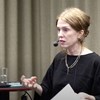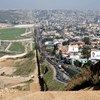indigenous
The popular sovereignty of Indigenous peoples: a challenge in multi-people states
Citizenship Studies ABSTRACT The doctrine of popular sovereignty holds that the ‘supreme authority of the state’ belongs to the people, not to the political institutions exercising public power. What ar
Endogenous Norm Formation Over the Life Cycle – The Case of Tax Morale
Economic Analysis & Policy, Vol. 42 No. 2, 2012
Endogenous Norm Formation Over the Life Cycle – The Case of Tax Evasion
Department of Economics, Uppsala University, Working paper 2011:13.

Kirsty Gover: Aboriginality and Alienage: Legal Pluralism at the Australian Border
Research seminar with Kirsty Gover, Professor at Melbourne Law School. Abstract The landmark Australian High Court case of Love-Thoms (2020) raised the possibility of constitutionalised Indigenous-sett

The territory of democracy
The presumption that the jurisdiction of the state extends to the borderes of a certain territory is increasingly being challenged, both by indigenous people within this territory, and by extraterritoriral border control.
Kirsty Gover: Aboriginality and Alienage: Legal Pluralism at the Australian Border
Place: At the Institute for Futures Studies, Holländargatan 13, Stockholm, or online. Research seminar with Kirsty Gover, Professor at Melbourne Law School. REGISTER AbstractThe landmark Australian High C

Ulf Mörkenstam
I’m Professor in Political Science at Stockholm University. I defended my dissertation at the same university in 1999. At the institute, I participate in the research project "The territory of democrac
Karin Bäckstrand: The Role of Non-state Actors in Global Climate Governance after COP22 in Marrakech
Professor in Environmental Social Science, Stockholm University ABSTRACTWhat is the roles of non-state actors, such as civil society, business, indigenous movements and cities, in global climate and th Conference of the Parties (COP15) in Copenhagen to COP22 in Marrakech, where Marrakech Global Climate Action was launched involving voluntary climate action commitments from more than 12 000 companies, investors, cities and regions, and civil society actors. Over this timeframe, we have seen a form of ‘hybrid multilateralism’ emerge, in which UN climate diplomacy blurs state and non-state participation in complex and intriguing ways with implications for the authority, legitimacy, and effectiveness of climate governance. This speaks, in different ways, to the transformed landscape of climate cooperation with a strengthened interface of multilateral climate diplomacy and non-state climate action and the potential roles, modes, and effects of non-state actors in the post-Paris period.
The institutional order of liberalization
British Journal of Political Science 52: 1465–1471 Abstract When authoritarian regimes liberalize, are there observable patterns in the ordering of reforms, and are these patterns distinct for cases that
Completed: Criminal networks and social organizing
How does criminal organization, for example in street gangs, arise? By understanding how the networks work, we can also suggest crime prevention strategies.








